 Petzlover
Petzlover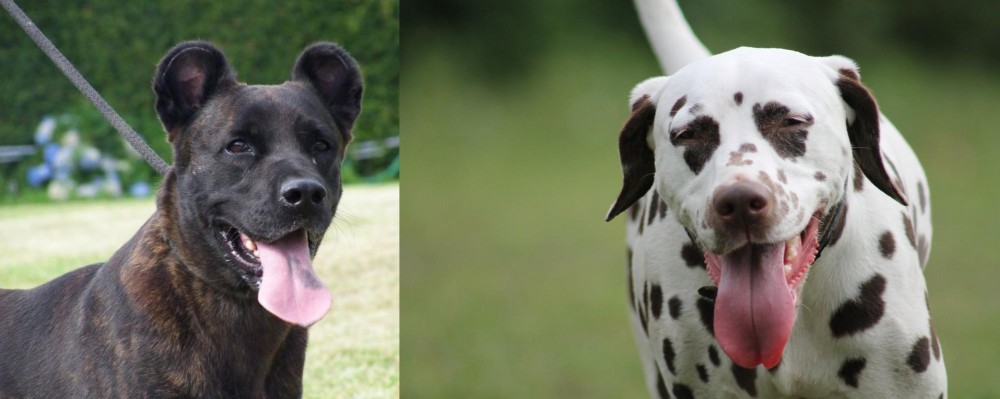 Cao Fila de Sao Miguel is originated from Portugal but Dalmatian is originated from Croatia. Both Cao Fila de Sao Miguel and Dalmatian are of same height. Cao Fila de Sao Miguel may weigh 9 kg / 20 pounds more than Dalmatian. Both Cao Fila de Sao Miguel and Dalmatian has same life span. Both Cao Fila de Sao Miguel and Dalmatian has almost same litter size. Both Cao Fila de Sao Miguel and Dalmatian requires Low Maintenance.
Cao Fila de Sao Miguel is originated from Portugal but Dalmatian is originated from Croatia. Both Cao Fila de Sao Miguel and Dalmatian are of same height. Cao Fila de Sao Miguel may weigh 9 kg / 20 pounds more than Dalmatian. Both Cao Fila de Sao Miguel and Dalmatian has same life span. Both Cao Fila de Sao Miguel and Dalmatian has almost same litter size. Both Cao Fila de Sao Miguel and Dalmatian requires Low Maintenance.
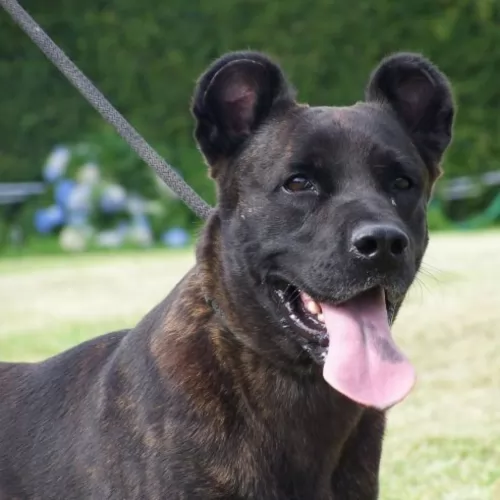 This Molosser type dog originated on Sao Miguel Island in the Azores, a region of Portugal. Known also as the Sao Miguel Cattle Dog or the Azores Cattle Dog, the existence of the Cao Fila de Sao Miguel has been documented since early in the 19th century.
This Molosser type dog originated on Sao Miguel Island in the Azores, a region of Portugal. Known also as the Sao Miguel Cattle Dog or the Azores Cattle Dog, the existence of the Cao Fila de Sao Miguel has been documented since early in the 19th century.
The dog has always been used as a cattle dog but today it remains rare outside of Portugal. In was in 1984 in Portugal that the first written breed standard was published in Portugal. The Cao Fila de Sao Miguel then earned recognition with the Portuguese Kennel Club.
 The history of the Dalmatian dog is also fairly scant, and the information you get is often unclear.
The history of the Dalmatian dog is also fairly scant, and the information you get is often unclear.
The name Dalmatian wasn’t used until the end of the 18th century, although it seems as though, according to murals on ancient tombs, there were white hounds then with specks over the body.
It does seem firm that the modern Dalmatian is because of breeding of the English nobility. They used these dogs to accompany them on their carriages. The dogs were also bred with the purpose of getting an exquisite spotted pattern.
It was in 1890 that the first Dalmatian Club was established in England and the dog was recognized by the American Kennel Club in 1888.
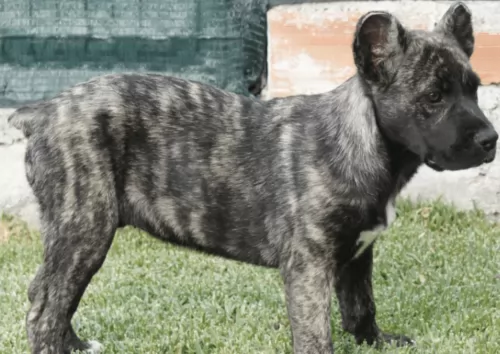 The Cao Fila de Sao Miguel is a medium to large sized dog standing 50 – 61cm in height and weighing 25 – 41kg. As with all molossers, the dog has powerful jaws.
The Cao Fila de Sao Miguel is a medium to large sized dog standing 50 – 61cm in height and weighing 25 – 41kg. As with all molossers, the dog has powerful jaws.
This dog breed has muscular limbs and dark brown eyes. The ears are normally docked into a rounded shape much like that of the Hyena. The tail has always been docked at the 2nd or 3rd vertebra but these days with regulations surrounding docking, the tail is unfortunately left long.
The coat of the Cao Fila de Sao Miguel is short and smooth while the hair on the tail and thighs is a bit longer. The Cao Fila de Sao Miguel is always brindled, and comes in shades of fawn, brown, gray or black. A white mark on the forehead around the chest or on the paws is also often seen.
The Cão de Fãila de São Miguel is a working dog who is used to guarding livestock. He is an athletic dog, game for plenty of action, and he will require plenty of daily exercise. He is territorial and makes an excellent guard dog, but even so, when it comes to his own owner and human family, he is gentle and loving.
The Cao de Fila de Sao Miguel is an intelligent dog and he will need training and socialization which allows him to get on well with children in the home as well as other pets.
 The Dalmatian is a medium sized dog with its beautiful white coat with black or liver spots being its main feature. The coat is short and dense and the Dalmatian pretty much sheds all year round.
The Dalmatian is a medium sized dog with its beautiful white coat with black or liver spots being its main feature. The coat is short and dense and the Dalmatian pretty much sheds all year round.
It is notable that at birth, the puppies are pure white, with their spots starting to form about 4 weeks later.
Both the male and female stand at anything between 56–61cm in height and weigh between 22 to 35kg. He is a slender, muscular dogs with plenty of stamina. The ears of the dog are floppy, he has brown eyes and a long tail.
With his human family, the Dalmatian is an active, playful dog. He has the reputation of being somewhat unfriendly and aloof, but many who have kept him as a pet say this isn't so. He loves to take part in games and gets on well with children in the home.
He is intelligent, but when it comes to strangers, the Dalmatian is reserved and even aloof. If you want to get the best from your Dalmatian, make sure that he is trained and socialized as he then knows how to behave well around people. He makes a good watchdog too.
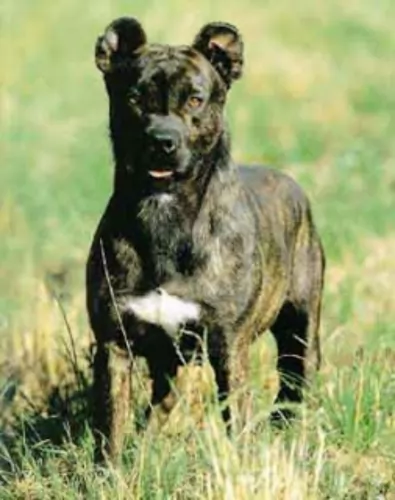 The Cão de Fila de São Miguel is a natural guard dog who will love and guard his family. With training and socialization he can become a devoted and gentle family dog with children and with other pets. They can be aloof with strangers.
The Cão de Fila de São Miguel is a natural guard dog who will love and guard his family. With training and socialization he can become a devoted and gentle family dog with children and with other pets. They can be aloof with strangers.
The Cão de Fila de São Miguel is an active dog who wants to be busy, and he is therefore better suited to country living rather that in a small home where space is limited.
Intelligent, a fast learner, protective and territorial, the Cão de Fila de Sao Miguel is an aggressive, hardy working breed who is also an excellent guard dog and protector. With firm training he becomes loyal, lovable and devoted – an ideal family companion.
 The Dalmatian is such a beautiful dog, energetic and playful and he is good with pets and children in the home.
The Dalmatian is such a beautiful dog, energetic and playful and he is good with pets and children in the home.
He is intelligent too and training and socialization for him will be easy and promise to bring out all his good points.
The Dalmatian became popular in the 1800's when they were used as coach-dogs, and their popularity has been enhanced because of films from Hollywood such as ‘101 Dalmatians’.
Unfortunately many people receive Dalmatian puppies as gifts after seeing movies like this and then hand their dogs into rescue centers when they grow up and are no longer the cute little puppy they first met.
Be a responsible dog owner. A Dalmatian has feelings and you need to commit to caring for him for up to 15 years. You’ll be rewarded by having a wonderful, loyal canine friend.
 The Cao Fila de Sao Miguel is a dog who enjoys exceptional health. When you do research you see there aren’t really any particular illnesses plaguing this dog, and he can actually live to be 15 years of age. Be aware of some illnesses as they are common among different dog breeds – hip- and elbow dysplasia, bloat, eye diseases such as progressive retinal atrophy and cataracts, heat intolerance and arthritis.
The Cao Fila de Sao Miguel is a dog who enjoys exceptional health. When you do research you see there aren’t really any particular illnesses plaguing this dog, and he can actually live to be 15 years of age. Be aware of some illnesses as they are common among different dog breeds – hip- and elbow dysplasia, bloat, eye diseases such as progressive retinal atrophy and cataracts, heat intolerance and arthritis.
This is a dangerous illness that can affect any dog – small or large. This is when the dog’s stomach fills with fluid or gas so that it expands. The stomach then puts pressure on other organs and your dog can have trouble breathing. There is also no blood flow to the heart. Sometimes the stomach of the dog twists and your pet can go into a state of shock. Recognize the symptoms of bloat – a swollen stomach, drooling and wanting to vomit but nothing coming up. Get your dog to the vet immediately.
An abscess can be so painful for your pet often when your dog has a thick coat it could go undetected. If an abscess on your pet doesn’t burst, or even if another abscess appears, a vet must be consulted and a course of antibiotics given.
Ear mites, dirt and a build up of wax may cause your dog to scratch at the ear, shake his head or hold it on one side. There may even be a foul-smelling discharge. Your dog will need to have his ears cleaned. Special ear drops can rectify the problem. Remember that hot, red ears will require veterinary attention.
 Dalmatians, with good care, can live to be about 10 to 15 years. However, just as with other breeds, the Dalmatian is prone to certain health problems that are more specific to their breed. Some of these problems are skin allergies, deafness and urinary stones.
Dalmatians, with good care, can live to be about 10 to 15 years. However, just as with other breeds, the Dalmatian is prone to certain health problems that are more specific to their breed. Some of these problems are skin allergies, deafness and urinary stones.
Dalmatians are known to have sensitive skin and they are prone to topical allergies. When you brush your dog, you should check his skin for redness and also check for fleas and ticks.
Red bumps on his skin could mean an allergy and can be distressing for your pet. Your pet may be scratching excessively and the skin may be red and moist with runny, itchy eyes. It is time to get your dog to the vet, who may prescribe an antihistamines to get the itching and allergies under control.
Unfortunately, the Dalmatian is a dog which has a tendency to form stones in the kidneys and bladder. A genetic mutation causes the raised uric acid levels which is more prevalent with the male Dalmatian. Straining to urinate can be tremendously stressful for your dog and you will need to get him to the vet immediately.
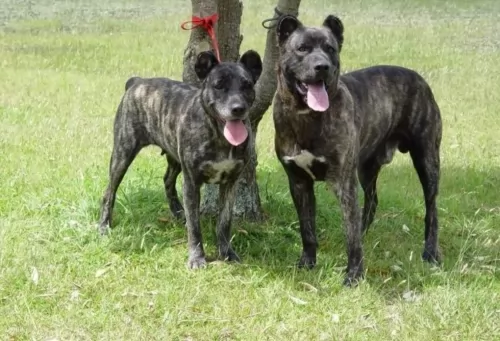 The Cao Fila de Sao Miguel is a low maintenance breed and all that will be required for him is that you give him a thorough brushing a couple of times a week.
The Cao Fila de Sao Miguel is a low maintenance breed and all that will be required for him is that you give him a thorough brushing a couple of times a week.
The Cao Fila De Sao Miguel puppy will require four meals of puppy food a day. The adult Cao fila de sao miguel can go down to 1 or 2 meals a day after his 1st birthday.
These days you get some excellent commercially manufactured dog foods and your veterinarian can help you choose one suited to this particular dog breed. Add in some home-made vegetables, rice and meat every now and then. The idea is to make sure your dog is getting in all the minerals and vitamins he needs.
There is evidence showing that dogs who enjoy raw meat every now and then enjoy a number of health benefits. Skin and teeth are improved, your dog has a shinier coat, less allergies,less inflammation and he is more relaxed and amicable. Ensure a constant supply of fresh, cool water in a clean bowl and at all times.
 The Dalmatian is an easy dog to maintain and brushing twice a week will get rid of loose hairs. What is notable with the Dalmatian is that not only does he look like a well groomed dog, he also doesn’t have that typical dog smell around him.
The Dalmatian is an easy dog to maintain and brushing twice a week will get rid of loose hairs. What is notable with the Dalmatian is that not only does he look like a well groomed dog, he also doesn’t have that typical dog smell around him.
No matter what kind of dog you have, a high-quality dog food is always beneficial for your dog’s health. Home-made food is always good for your dog and wholesome food such as brown rice, vegetables and some cooked chicken will delight your pet and keep him interested in his food.
There are also excellent manufactured foods and kibble is a good food to have when you select it according to your dog’s age and energy levels.
These foods, especially the top quality ones, ensure your pet gets all the nutrients he needs. Adding some raw meat into the diet can be highly beneficial for your pet and will keep him bright eyed, bushy tailed and with a wet nose.